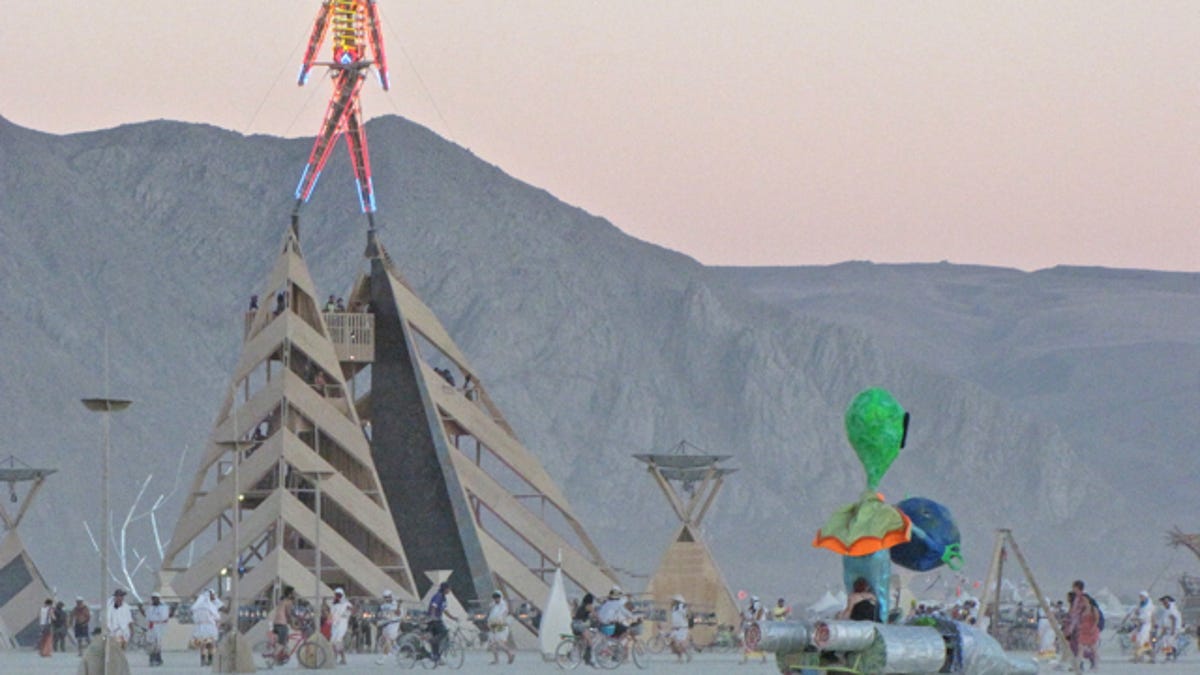Burning Man tackling community fury in ticket snafu
After large numbers of longtime 'Burners' failed to get tickets during the event's recent selection process, many claimed organizers had failed to adopt a sensible system. Now, those organizers are trying to calm community anger.

Burning Man organizers are scrambling to quiet a loud and angry response to its recent ticket lottery, a drawing that resulted in less than a quarter of its most ardent community members getting selected.
And while the organization behind the countercultural arts festival that's held annually in Nevada's Black Rock Desert didn't offer any specific solutions to upset members of the Burning Man community, they did say they are looking for ways to ensure that most artists and others involved in "key" projects will be ensured of being able to attend.
The problem arose after Burning Man--which has a federal permit allowing around 50,000 attendees for the week-long festival--sold out for the first time in 2011, a situation that resulted in speculators selling tickets for prices well above face value. The event has also suffered from issues in the past surrounding ticket sales.
This year, organizers tried to address the likelihood of another sell-out and their desire to thwart speculators with what many now feel was an ill-conceived lottery. Under the system's plan, anyone wanting tickets was given two weeks to register their interest.
"During the registration period you will register for an opportunity to purchase tickets, choosing the highest level you can afford," read a FAQ on the process. "You will automatically be entered in to the tiers below that. At the end of the registration period, a computerized random selection will be conducted to award tickets to participants."
The pricing tiers were $240, $320, and $390.
The system also relied on what is called the secondary ticket exchange program that was designed to give "Burners with extra tickets a safe, no-hassle way to sell their tickets back into the community, and a way for those needing tickets to buy them at face value without the worry of over-inflated prices, scams or possible counterfeit tickets."
But many felt from the beginning that the system didn't make sense, and worried that they would not be selected. And that, apparently is exactly what happened to large numbers of would-be "Burners" including many longtime attendees.
Today, in a posting to its official Jack Rabbit Speaks newsletter, the organization attempted to calm the fury.
"The Burning Man organization recognizes that the ticket registration and random drawing process has caused many participants frustration and concern over whether they can attend this year," wrote director of business and communications Marian Goodell. "The organization is [now] looking at short term fixes and long term solutions to improve the ticketing process to make it work as well as possible for as many people as possible."
One clear problem, Goodell admitted, is that "we determined that only 20 percent to 25 percent of the key people needed to bring [major theme camps and art projects] to the [desert] had received notifications for tickets....Burning Man's most important priority is to make sure the community stays intact in the face of the current challenges. Combining what we learned [from internal discussions and conversations with community members], we've come up with some ideas to address the short term issues. We will continue to gather information and listen to your feedback as we work towards announcing our plans within two weeks."
Some members of the community had responded angrily to the ticket drawing, once it became clear that few veteran attendees had successfully gotten tickets. The subject line of a discussion thread on one email list was titled "Burning Man Ticket Denial Letters Out Now."
To hear those upset about the ticket situation talk about it, the organization neglected to adopt many sensible ticket distribution schemes that could have addressed the issue of scalpers and speculators, while also ensuring that those who bought tickets would be able to sell them if circumstances required it. One common idea was that tickets should be linked to a driver's license or other official ID.
But in the FAQ, Burning Man dismissed such a procedure, noting that "It has been our experience that a great many tickets are purchased for giving away, ensuring a project has coverage, or selling later to a friend in need. The administrative cost of changing the name on every ticket that ever changes hands exceeds our capacity. And frankly, many of your fellow [Burning Man] citizens are uncomfortable with the notion of showing ID just to enter the event."
In her letter to the community, Goodell did not say what the organization planned to do--and she also admitted the probability that regardless of what it does, some community members would end up without tickets. "The demand clearly exceeds supply," Goodell wrote. "But we are going to do everything we can in the coming days to ensure that we preserve and respect the community that supports and creates this event both in the short term and long term."
Added Goodell, "We will be reaching out to you and working with you to make that happen. We recognize that we have work to do to repair the faith in the organization. We are very sorry for the frustration, anxiety, and deep disappointment this year's ticketing experience has caused for so many citizens of Black Rock City."

